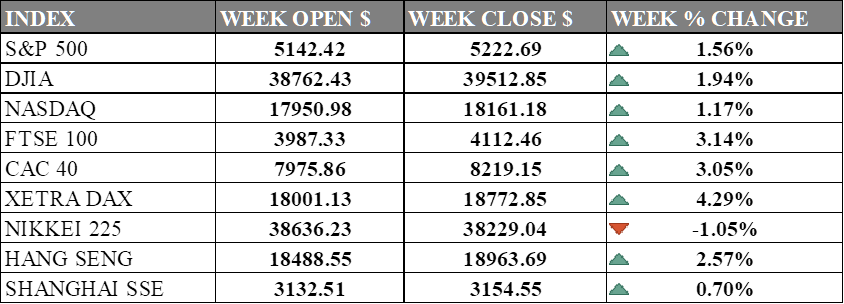PAST WEEK'S NEWS (May 06 – May 10, 2024)
Japan's currency diplomat, Masato Kanda, came out and refuted claims about limitations in the country's foreign currency reserves for market intervention, asserting their readiness to take action after 160 lines on the sand are washing away, with markets remaining bearish ahead of the upcoming U.S. inflation data release. Finance Minister Shunichi Suzuki reiterated his concerns about the economic impacts of excessive yen weakness, particularly regarding higher import costs. During the April meeting, BOJ members emphasised the need for steady interest rate hikes and the necessity of reducing bond purchases in the future. One member suggested that policy rates could rise higher than currently priced in by the market if the BOJ's growth and inflation projections are realised.
The European Central Bank (ECB) is growing increasingly confident about cutting interest rates as inflation in the euro zone continues to ease. ECB policymakers Philip Lane, Gediminas Simkus, and Boris Vujcic stated that recent data on inflation and economic growth support their view that inflation will return to the ECB's 2% target by mid-2024. The ECB has virtually promised a rate cut in June, and markets are pricing in three rate cuts this year. This would lower the deposit rate from 4% to 3.25%, still considered restrictive but intended to slow declining economic activity. Meanwhile, in the UK, the pound was higher ahead of the Bank of England's (BoE) policy announcement this week, though markets largely shrugged off the ruling Conservatives' losses in local elections.
INDICES PERFORMANCE

The major U.S. stock indexes gained last week. The S&P 500 rose 1.56% to close at 5222.69, up from its open of 5142.42. The Dow Jones Industrial Average (DJIA) gained 1.94% to finish at 39512.85 compared to its opening level of 38762.43. The Nasdaq also rose 1.17% to 18161.18 after opening the week at 17950.98. The gains are attributed to positive earnings reports and economic data that exceeded expectations, boosting investor confidence in the market's resilience.
In Europe, the major indexes saw significant gains. The UK's FTSE 100 surged by a notable 3.14% to close at 4112.46 compared to its open of 3987.33 due in part to a rebound in retail sales and consumer confidence. Germany's XETRA DAX soared by an impressive 4.29% closing at 18772.85 from its starting point of 18001.13 buoyed by strong industrial output data. France's CAC 40 climbed up by 3.05% to end the week at 8219.15 after opening at 7975.86 supported by positive corporate earnings and positive economic forecasts.
Asian markets had a mixed performance with Japan's Nikkei 225 declining while others posted gains. Japan's Nikkei 225 dipped -1.05%, closing at 38229.04 versus its open of 38636.23 due in part to concerns over rising currency concerns. Hong Kong's Hang Seng surged by an impressive 2.57% finishing off at 18963.69 from its starting level of 18488.55 boosted by strong retail sales data and positive sentiment around easing geopolitical tensions. China's Shanghai Composite posted modest gains of 0.70%, ending the week on 3154.55 compared to an opening figure of 3132.51 supported by government stimulus measures and positive manufacturing data.
CRUDE OIL PERFORMANCE

Oil prices ended the week with little changed. The gains from a larger-than-expected drawdown in U.S. crude oil inventories were offset by easing geopolitical risk premiums and concerns about oil demand. Mixed economic data from China weighed on sentiment while Chinese consumer inflation rose, producer prices continued falling for the 19th straight month, pointing to weak factory and business activity. Oil markets were also on edge ahead of key U.S. inflation data this week, as cooling inflation could allow the Federal Reserve to cut interest rates, potentially boosting oil demand. However, uncertainty lingered over whether OPEC and allies will extend their production cuts beyond the June deadline, with analysts divided on the likelihood of an extension. Overall, oil lacked clear direction last week amid conflicting supply and demand signals in the market.
OTHER IMPORTANT MACRO DATA AND EVENTS
New unemployment claims reached an eight-month high last week, indicating the labour market is steadily slowing down. This slowdown in the labour market has raised the possibility of the Federal Reserve cutting interest rates twice this year.
China's exports and imports returned to growth in April after contracting in March, suggesting policy measures may be stabilizing confidence. However, analysts question the sustainability of the export rebound due to concerns over excess manufacturing capacity and price-cutting by Chinese exporters amid weak domestic demand.
What Can We Expect from The Market This Week
US CPI April: Consumer inflation increased by 0.4% on a seasonally adjusted basis, with the all items index rising by 3.5% over the last 12 months. The rise was driven by fuel and housing costs, which has led to a scaling back of expectations for an imminent cut in interest rates.
US Retail Sales: In the first quarter of 2024, US retail sales saw a year-over-year increase of 5.3% in March, surpassing expectations and inflation, indicating a strong demand for goods. Consumers continued to spend despite higher prices and interest rates, with a major trend seen in sales at non-store retailers, gasoline stations, and miscellaneous store retailers.
Japan GDP Q1: Japan's economy likely contracted an annualised 1.5% in Q1 2024 due to weak consumption and an uncertain outlook. The contraction was driven by factors such as rising living costs, a strong trend of thrifty consumers, and the impact of earthquakes on the Noto Peninsula.
German CPI April: Consumer inflation in Germany remained steady at 2.2% year-on-year, falling short of the market expectation of 2.3%. The disinflation stalled at 2.2%, with a monthly increase of 0.5% following a 0.4% rise in March.
Chinese Industrial Production: Industrial production in China grew by 4.5% year-on-year, marking a rebound after five consecutive months of contraction. This growth, however, was softer than the 7% growth in January-February combined and fell below market forecasts of 5.4%, indicating a moderate recovery in manufacturing, utilities, and mining.













